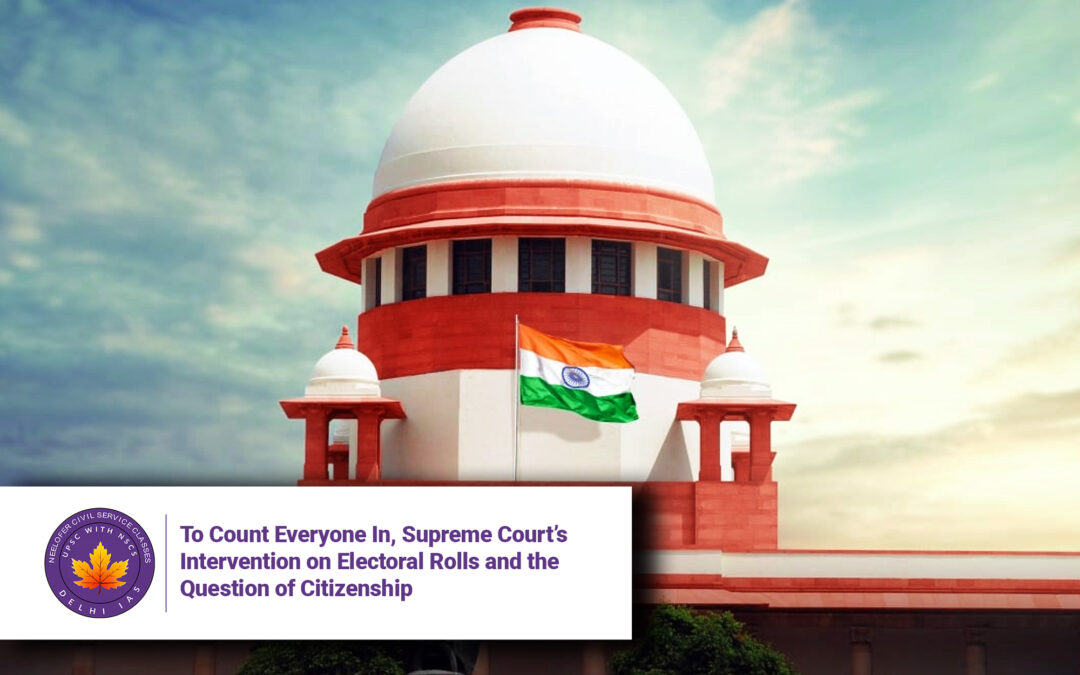To Count Everyone In, Supreme Court’s Intervention on Electoral Rolls and the Question of Citizenship
Introduction
India’s democratic framework rests on the principle of universal adult suffrage—the idea that every citizen above 18 years of age has the right to vote, regardless of class, caste, gender, or religion. The electoral roll, therefore, is not merely an administrative record but a reflection of the inclusiveness of the democratic process.
In August 2025, the Supreme Court (SC) delivered an important order in Association for Democratic Reforms vs Election Commission of India (2025). This case, arising in the context of the “Special Intensive Revision” (SIR) exercise in Bihar, directed the Election Commission of India (ECI) to make the draft electoral roll more accessible and transparent. Specifically, the SC asked the ECI to provide reasons for the exclusion of voters from the rolls, enabling those excluded to challenge the decision.
The order is a landmark because it touches upon the delicate intersection of citizenship, democratic rights, and electoral integrity. It also revives debates from a similar controversy three decades earlier in Lal Babu Hussain vs Electoral Registration Officer (1995). The parallels between these two cases—separated by 30 years—highlight the enduring challenges of balancing electoral transparency, individual rights, and state authority.
This essay unpacks the historical context, legal reasoning, institutional tensions, and broader implications of the SC’s latest order, while situating it within India’s ongoing struggle to reconcile the question of who counts as a voter in the world’s largest democracy.
Background: Electoral Rolls and the Representation of People Act
The Representation of People Act, 1950, along with the Registration of Electors Rules, 1960, governs the preparation and maintenance of electoral rolls in India.
Normally, the ECI undertakes two kinds of revision:
-
Annual summary revision (a routine process), and
-
Special intensive revision (SIR), used in exceptional circumstances when the electoral rolls need major corrections or fresh scrutiny.
The SIR is not an ordinary process. It usually arises from political controversies, allegations of fraudulent voters, or security concerns. Its purpose is to identify ineligible names, particularly those suspected of being “non-citizens.”
However, as the SC has repeatedly noted, the exercise cannot turn into a de facto citizenship verification drive. The responsibility of the ECI is to prepare a clean, inclusive, and accessible voters’ list—not to adjudicate on the citizenship status of individuals.
The Lal Babu Hussain Case (1995): A Precedent
The 1995 Lal Babu Hussain judgment provides the historical backdrop for the current controversy.
In 1994, during a similar drive in Delhi and Mumbai, the ECI instructed officials to verify voters’ citizenship status by demanding proof of nationality. Ration cards and other commonly used identity documents were rejected. The move sparked public uproar, with lakhs of people asked to prove their citizenship, often without adequate evidence.
Those affected challenged the ECI’s move in the Bombay High Court and Delhi High Court, and the matter eventually reached the Supreme Court.
The SC, in its 1995 judgment, firmly ruled that:
-
Electoral officials cannot demand proof of citizenship from voters in such a sweeping manner.
-
Unless there is credible material evidence to suspect non-citizenship, a voter’s inclusion cannot be questioned arbitrarily.
-
The burden of proof cannot be unfairly shifted onto individuals to repeatedly establish their citizenship.
This judgment was a critical safeguard against overreach by the ECI, ensuring that the preparation of electoral rolls remained a process of inclusion rather than exclusion.
The 2025 Case: Association for Democratic Reforms vs ECI
Fast forward to 2025, the Supreme Court once again intervened, this time in the context of the Special Intensive Revision in Bihar.
The ECI had claimed that the SIR was necessary to remove “non-citizens” from the electoral rolls. However, reports emerged of widespread arbitrary exclusions and lack of transparency. Citizens found their names missing without explanation, and the ECI did not provide reasons for deletions.
The SC’s order in this case carried two key directives:
-
Transparency in Electoral Roll Management
-
The ECI must now provide specific reasons for excluding a voter from the draft roll. This enables affected individuals to challenge the decision in a fair process.
-
-
Limits on Citizenship-Based Exclusion
-
Echoing Lal Babu Hussain, the SC reiterated that the ECI cannot act as an authority on citizenship. Its role is limited to maintaining electoral rolls, not determining nationality.
-
This judicial nudge emphasizes that citizenship disputes belong in the domain of law and specialized tribunals, not in the day-to-day functioning of electoral registration officers.
Tensions Between the ECI and SC
The recurring conflict between the ECI and SC reveals a deep institutional dilemma.
-
The ECI’s approach often leans toward caution, with a tendency to over-police voter rolls, partly due to political pressure about “bogus voters” or “illegal immigrants.”
-
The SC’s approach, in contrast, prioritizes inclusion, fairness, and constitutional safeguards, stressing that errors of wrongful exclusion are more damaging to democracy than wrongful inclusion.
Over the years, the SC has also nudged the ECI to implement reforms such as:
-
Disclosure of candidates’ criminal records and assets,
-
Recognition of the “None of the Above” (NOTA) option,
-
Disqualification of convicted legislators.
In many of these cases, the SC has struck down ECI practices that undermined inclusivity or transparency. The current order follows that trajectory, ensuring that voters are not arbitrarily disenfranchised.
The Problem of Proof and Citizenship
One of the thorniest issues in these disputes is the question of proof of citizenship.
-
Documents such as Aadhaar cards, Electoral Photo Identity Cards (EPIC), and ration cards are widely held but not legally conclusive proof of citizenship.
-
This creates a paradox: citizens possess government-issued IDs, yet their right to vote can still be questioned.
In the 1990s, this paradox led to mass disenfranchisement in cities. In 2025, the same concern resurfaced in Bihar during the SIR.
By reminding the ECI of the limits of its powers, the SC sought to protect citizens from being unfairly excluded due to bureaucratic suspicion or flawed documentation practices.
Democracy, Inclusion, and the Supreme Court’s Role
The SC’s insistence on transparency is rooted in the constitutional principle of universal franchise. India’s Constitution does not tie voting rights to property, literacy, or any other qualification except citizenship.
The fear is that without proper safeguards, electoral roll revisions could become tools of political manipulation, where certain groups—especially the poor, marginalized, and linguistic minorities—face disproportionate exclusion.
By mandating reasoned exclusions, the SC is essentially reinforcing that democracy must err on the side of inclusion.
Broader Implications of the Judgment
-
Strengthening Democratic Credibility
-
Transparent electoral rolls enhance public trust in elections, ensuring that all citizens feel represented.
-
-
Check on Arbitrary Power
-
By circumscribing the ECI’s role, the SC has prevented potential misuse of the electoral process for political ends.
-
-
Revisiting Citizenship Debates
-
The judgment indirectly intersects with ongoing debates about illegal immigration, NRC (National Register of Citizens), and CAA (Citizenship Amendment Act). It underscores the need to separate citizenship adjudication from electoral administration.
-
-
Administrative Burden
-
Providing detailed reasons for exclusions will require significant administrative effort from ECI officials. However, this burden is justified to prevent wrongful disenfranchisement.
-
Conclusion
The Supreme Court’s intervention in 2025 reinforces an enduring truth: democracy thrives when more people are included, not excluded. By nudging the ECI to provide transparency and limiting its overreach on citizenship issues, the Court has reaffirmed the principle that electoral processes must be rooted in fairness, accessibility, and inclusivity.
Just as in Lal Babu Hussain (1995), the 2025 judgment will likely serve as a landmark precedent in shaping how electoral rolls are managed in India. It is a reminder that the right to vote is the cornerstone of democracy, and protecting it is as much a constitutional duty as it is a moral imperative.
5 Exam-Oriented Q&A
Q1: What was the main issue in the Supreme Court’s 2025 order on electoral rolls?
A1: The main issue was the lack of transparency in the Special Intensive Revision (SIR) in Bihar. The SC directed the ECI to provide reasons for voter exclusions and emphasized that the ECI cannot act as an authority on citizenship.
Q2: How does the 2025 case connect to the Lal Babu Hussain judgment of 1995?
A2: Both cases addressed the problem of the ECI demanding proof of citizenship from voters. In both, the SC ruled that unless credible evidence exists, voters cannot be arbitrarily asked to prove citizenship. The 2025 case reaffirmed the principles laid down in 1995.
Q3: Why are documents like Aadhaar or EPIC not considered conclusive proof of citizenship?
A3: These documents establish identity and residence, but not legal citizenship. Citizenship requires proof of birth or descent under Indian law, which these documents do not provide.
Q4: What constitutional principle underlies the SC’s directive on electoral rolls?
A4: The principle of universal adult suffrage (Article 326 of the Constitution) underlies the SC’s directive. The Court emphasized that democracy must err on the side of inclusion, not exclusion.
Q5: What are the broader implications of the SC’s order?
A5: The order strengthens democratic credibility, prevents arbitrary disenfranchisement, keeps electoral and citizenship issues distinct, and ensures that voter roll revisions remain transparent and fair.







